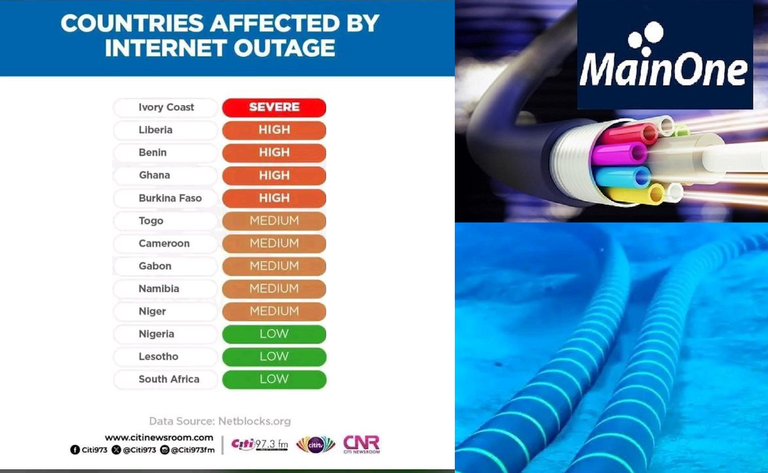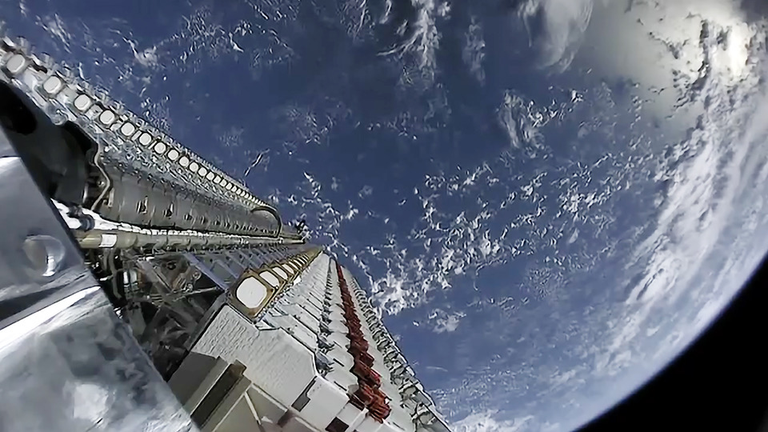Submarine Cable Cut disrupt Internet in 13 African Countries: A Case for Decentralized Internet Service
KEY FACT: Submarine Cable Cut has disrupted Internet access in 13 African Countries. This makes a case for decentralized Internet Service options that would provide private, safe, and open internet access for all.

Collage by Corel Paint
Internet Disruption in 13 African Countries
Open, secure, and reliable connectivity is essential for rights such as freedom of speech, expression, and freedom of association. This is not the case in Nigeria and 12 other African countries that have experienced an internet downtime in the past 48 hours. Countries affected include Ivory Coast (severe outage), Liberia, Benin, Ghana, Burkina Faso (high outage), Togo, Cameroon, Gabon, Namibia, Niger (Medium outage), Nigeria Lesotho, and South Africa (low outage).
Reports have it that the MainOne's submarine cable cuts which occurred on Thursday affected subsea cable providers and disrupted internet traffic in major parts of the continent. The issue is said to be causing downtime across West and South African countries, affecting telecommunications networks as well as banks in Nigeria. According to reports, the damage affected major undersea cables near Abidjan in Côte d’Ivoire, affecting submarine communications cables, including West Africa Cable System (WACS), the Africa Coast to Europe (ACE), MainOne, and SAT3.
MainOne is the major internet provider for most banks and internet providers in African countries. They provide broadband cable Internet which typically utilizes a physical cable infrastructure, such as coaxial or fiber-optic cables, to deliver high-speed Internet access to subscribers. Broadband cable Internet offers fast and reliable speeds, with performance often unaffected by weather conditions. However, availability is limited to areas with cable infrastructure, and congestion during peak usage times can slow down speeds.
Other Broadband cable Internet providers include Comcast Xfinity, Cox Communications, Spectrum, and Optimum. These companies offer high-speed Internet access through their cable infrastructure, providing services to homes and businesses in urban and suburban areas where cable networks are available.
MainOne says repairing its undersea cables might take about three weeks, as 13 African countries grapple with internet disruptions.
“We have a maintenance agreement with Atlantic Cable Maintenance and Repair Agreement (ACMA) to provide repair services for the submarine cable.
“First identify and assign a vessel, the vessel has to retrieve the necessary spares required for repair, and then sail to the fault location to conduct the repair work.
“Next, in order to complete the repair, the affected section of the submarine cable will have to be pulled from the seabed onto the ship where it will be spliced by skilled technicians.” - Source
We are expecting another three weeks of hindered social expressions and interactions. The surprising aspect of this ordeal is that in Nigeria, web2 social media like Facebook, WhatsApp, Instagram, X (Twitter), etc, are still working well. The effect of the network outage is huge on banking apps, browsers, and our web3 wallets. Posting on Hive blockchain has become more difficult than ever.
A Case for Alternative Internet Service Providers
At this point, there is a dire need for alternatives just as we have alternative energy systems. It is obvious that centralized internet service provision can put a whole continent on a whole.
Satellite Internet provided by Elon Musk
Satellite Internet has become a thing with Elon Musk's Starlink. Satellite Internet relies on satellites orbiting the Earth to transmit data signals to and from a satellite dish installed at the subscriber's location. It provides coverage to remote and rural areas where cable infrastructure is unavailable. Satellite Internet providers include HughesNet and Viasat (formerly Exede). These companies offer satellite Internet services to customers in rural and remote areas where traditional broadband options like cable or DSL are not available. Users in such areas rely on s
Leading Satellite Internet providers include SpaceX, HughesNet, and Viasat (formerly Exede). These companies offer satellite Internet services to customers in rural and remote areas where traditional broadband options like cable or DSL are not available. SpaceX launched Starlink satellites in 2019 and its distributed to over 70 countries.
Satellite Internet tends to have higher latency (delay) due to the long distance signals must travel between Earth and the satellite, which can affect activities like online gaming and video calls. Weather conditions such as heavy rain or snow can disrupt the satellite signal, impacting service reliability.
A Case for Decentralized Internet Services
Decentralized Internet Services would prioritize user privacy, data ownership, and censorship resistance. Decentralized internet service providers would be the best alternative approach to traditional centralized internet services by leveraging peer-to-peer networking and blockchain technology.
We are in dire need for decentralized internet service providers that would receive crypto for their services. Decentralized internet has the potential to enhance user privacy and promote a more open and resilient internet ecosystem. Agreed that there would be challenges such as technical complexity, slow adoption, and regulatory issues.

If you found the article interesting or helpful, please hit the upvote button, and share for visibility to other hive friends to see. More importantly, drop a comment below. Thank you!
This post was created via INLEO, What is INLEO?
INLEO's mission is to build a sustainable creator economy that is centered around digital ownership, tokenization, and communities. It's Built on Hive, with linkages to BSC, ETH, and Polygon blockchains. The flagship application: Inleo.io allows users and creators to engage & share micro and long-form content on the Hive blockchain while earning cryptocurrency rewards.
Let's Connect
Hive: inleo.io/profile/uyobong/blog
Twitter: https://twitter.com/Uyobong3
Discord: uyobong#5966
Posted Using InLeo Alpha


https://inleo.io/threads/uyobong/re-uyobong-2hz7jgkdi
The rewards earned on this comment will go directly to the people ( uyobong ) sharing the post on LeoThreads,LikeTu,dBuzz.
I looked at a map of the cuts. It appears that cities on the West Coast of Africa are depending on underwater lines.
One would expect to see more land based lines. Perhaps local politics makes that impractical.
I hope the Continent heeds the call to build a more resilient infrastructure.
!WINE
Posted using STEMGeeks